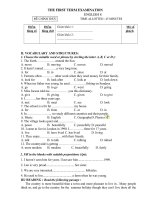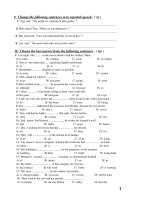Tài liệu ANH VĂN LỚP 11
Bạn đang xem bản rút gọn của tài liệu. Xem và tải ngay bản đầy đủ của tài liệu tại đây (41.87 KB, 2 trang )
<span class='text_page_counter'>(1)</span><div class='page_container' data-page=1>
<b> </b>
<b>Gerund - Infinitive </b>
<b>One of the difficulties of the English language is that </b>
<i><b>some verbs are followed by the gerund (ex : doing) </b></i>
<i><b>and others are followed by the infinitive (ex : to do).</b></i>
<b>Below you will find a table to help you : </b>
<b>When do you use the </b>
<b>GERUND? (ex : doing) </b> <b>When do you use the </b>
<b>INFINITIVE? ( ex : to do)</b>
<b> ● After verbs that express </b>
<b>likes/dislikes : </b>
<b> </b>
<b> like, love, enjoy </b>
<b> dislike, hate </b>
<b> don't mind, can't stand ... doing</b>
<b>• After certain other verbs, such </b>
<b>as : </b>
<b> </b>
<b> admit imagine </b>
<b> appreciate involve </b>
<b> avoid keep (on) </b>
<b> consider mention </b>
<b> delay miss </b>
<b> deny postpone </b>
<b> finish suggest ... </b>
<b>doing </b>
<b>• After prepositions : </b>
<b> </b>
<b> interested in ... </b>
<b> instead of ... </b>
<b> good at ... </b>
<b> before ... </b>
<b> after ... </b>
<b>doing </b>
<b>• After certain expressions : </b>
<b> it's no use ... </b>
<b> it's no good ... </b>
<b> there's no point in ... </b>
<b>doing</b>
<b>● After verbs that refer to a future </b>
<b>event : </b>
<b> want, hope, intend </b>
<b> would like, promise ... to do </b>
<b> ● After certain other verbs, such </b>
<b>as : </b>
<b> </b>
<b> afford help </b>
<b> agree learn </b>
<b> arrange manage </b>
<b> choose offer </b>
<b> fail refuse </b>
<b> happen seem ... to do </b>
<b>• After adjectives : </b>
<b> glad (ex : glad to know...) </b>
<b> pleased (ex : pleased to meet </b>
<b>you...) </b>
<b> disappointed (ex : </b>
<b>disappointed to hear...) </b>
<b>• After "too" & "enough": </b>
<b> too difficult </b>
<b> easy enough ... to </b>
<b>do</b>
<i><b>• The verbs : begin/start/continue can be followed by the gerund or the </b></i>
<b>infinitive </b>
<b> with little or no change in meaning.</b>
<i><b>• The verbs : stop/try/remember can also take both, but the meaning </b></i>
</div>
<span class='text_page_counter'>(2)</span><div class='page_container' data-page=2>
<b>Gerund - Infinitive</b>
<b> </b>
<b>Fill in the blanks below with the correct form of the verb in brackets.</b>
1.
It's obvious he's only interested in (make) _making______ money.
2. Anne couldn't find a taxi so I offered (drive) __drive___________
her to the station.
3. I managed (book) _to book_________ two seats on the morning
flight
4. I promise (send) __to send____ you our new brochure as soon as
it's available.
5. Peter was delighted (meet) _of meeting a former colleague at the
conference.
6. I avoid (take) ___taking the car whenever possible, especially in
big cities.
7. We finished the job by (work) __working_ 12 hours a day.
8. Bob sent a report to the Chairman instead of (attend)
_attending_____ the meeting.
9. A lot of people dislike (drive) ___driving at night.
<b> </b>
</div>
<!--links-->









